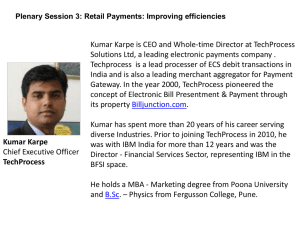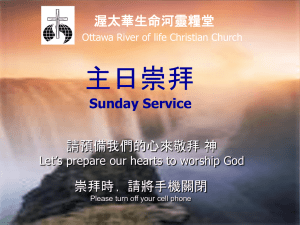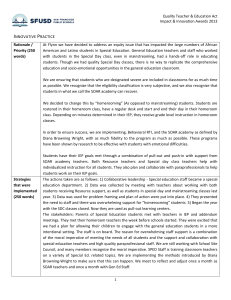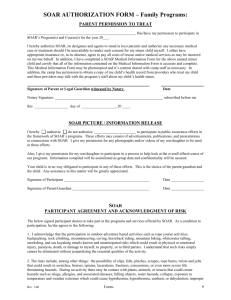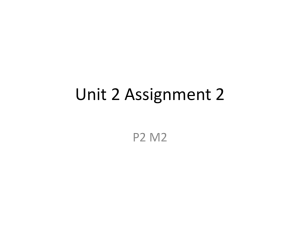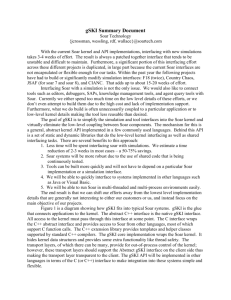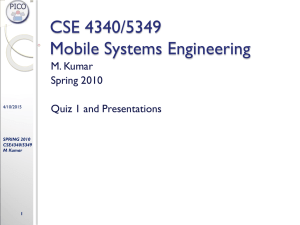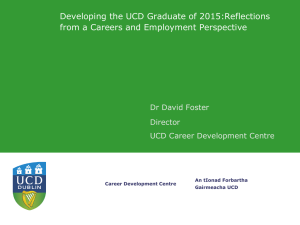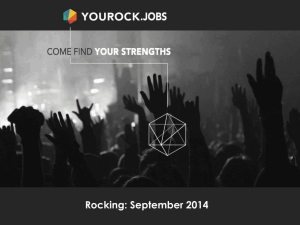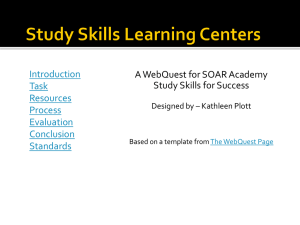Employability in curricula
advertisement
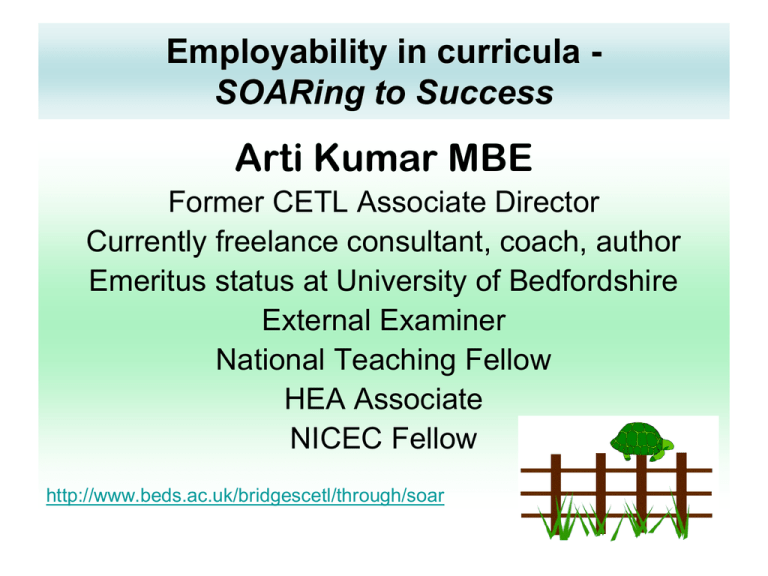
Employability in curricula SOARing to Success Arti Kumar MBE Former CETL Associate Director Currently freelance consultant, coach, author Emeritus status at University of Bedfordshire External Examiner National Teaching Fellow HEA Associate NICEC Fellow http://www.beds.ac.uk/bridgescetl/through/soar The current typical employability landscape: • Academic debates about terminology • The demand for evidence, research and theory • Provider-centric mind-set / culture What connects all these areas? Provision might include: Employer involvement Internships Volunteering, work experience, student jobs… E-portfolios The Higher Education Achievement Report Personal Development Planning Career Management Skills A focus on ‘graduate attributes’ Subject-specific /occupation-specific skills Skills awards Book/e-book: Kumar, A (2008) London & New York: Routledge Taylor & Francis Why SOAR for employability?* • Enables individuals to identify and critically appreciate the universal and personal recursive relationships between Self, Opportunity, Aspirations, and Results • Use SOAR as an engaging process of reflective-active learning for holistic personalised development • Contextualise in your curriculum • Pick & mix resources that develop graduate attributes and professional identity within a coherent framework • Time-tested & evaluated with students & staff (in the UK and abroad) • Theory linked with pedagogy & process *Kumar, A. (2009b) ‘SOARing for Employability: can Assessment Centre approaches engage students?’ in Atlay, M. (ed.) Creating Bridges: A collection of articles relating to implementing the Curriculum Review 2008 (CRe8) University of Bedfordshire internal publication. Main underpinning theories (pedagogy linked with practice) Appreciative inquiry Self-efficacy Engaging with ‘Opportunity’ Optimistic Aspirations Effective Results Career theories e.g. Psychological: Super, Holland… Social: Community Interaction (Law) Career Decision Learning (Law) Education development theories Personal and social constructionist approaches Constructive alignment (Biggs, 2003) Positive psychology approaches to teaching, learning and assessment Threshold Concepts in Employability Curricula, Arti Kumar: http://www.heacademy.ac.uk/assets/documents/employabili ty/ArtiKumarEmployabilityArticle.pdf elf as ‘Hero’ in the journey of life What strengths and development needs do I bring to ‘x’ opportunity? What do I need to do and develop in order to be(come) effective and productive in a complex, competitive, changing world? Recent research with MBA students, 99% from India: Kumar, A. (2012) SOARing for Employability – Can this serve as a transferable pedagogy and process for developing ‘global graduates’? Proceedings of the 7th QSAPPLE Conference, Manila, November 2011, p.4-15. ‘Begin with the end in mind’ …* What result do you need / want to achieve? nd of align Own2and *The Covey’s 7 habits of goals highly with personal effective people professional requirements Goal setting and personal agency theories It’s your journey through life: are you in the driving seat? My Self My Opportunities My Aspirations My Results elf’ at the heart of SOAR • Identify strengths (not easy, however!) – “something I do best” – “something I do better than others” – “…which few others are good at” – “…and which is aligned with the requirements of ‘x’ opportunity” • Address development needs • Develop Self-MAPs to provide directions and destinations to build and guide your progress through a life-career My SelfMAP* What *MAP* do you need to be(come) effective and productive – in learning, work & life in general? *Motivation (beliefs, interests, priorities) Ability (knowledge, skills, competencies) Personality (interactions My SelfMAP* What does your Self-MAP look like? Reflect or share in pairs / groups… One thing that motivates you – what gives you a buzz? One thing you are good(or best) at – a skill or ability One positive aspect of your personality – how do you like to interact with others? Your MAPs can be evidenced in learning, work and life in general Then one could discuss (given the time)… How has your MAP influenced your journey so far? How could it help you reach your goal(s), etc. How could SOAR work for your students? Self- Opportunity awareness: Assignment: Students choose an option or occupation and explore the extent of alignment between their MAP and the MAP required in this developmental ‘world of opportunity’ “I have enjoyed being a volunteer at the BBC regional radio station. I don’t think I want to do this for a career though…” First year student’s reflective log in e-portfolio Opportunities for learning and developing in multiple contexts In the community In study At leisure “I never knew I had so much substance!” (student) as a ‘meta-model’ : - students understand, identify and develop effective behaviours - move from student to graduate to professional identity How captured • (e)-portfolio? • HE Achievement Report (HEAR)? • CV / resume? Reciprocal model of causal relations between selfevaluation, self-monitoring and achievement (John Hattie) Driving behavioural competencies towards personal and interpersonal effectiveness in tandem beds.ac.uk/bridgescetl An example of self-assesment: In relation to group / team effectiveness… To what extent do I (a) consider these actions important; (b) act in this way? – Where 4 = high and 1 = low I express myself confidently and assertively a) Ratings 1–4 importance b) Ratings 1-4 frequency The behaviours I consider most important are… My highest ratings:… I contribute ideas and suggestions relevant to the task I take on a specific role when required I listen respectfully to others I support others’ positive contributions I focus (or re-focus) the group on its tasks and goals I help the group to achieve its goals within a given timeframe Evidence that I do this in real life… Areas I need to improve:… Opportunities I will use in order to improve… Self-Opportunity-Aspirations …generate, clarify, test aspirations 'Whatever you can do, or dream you can, begin it! Boldness has genius, magic, and power in it.' (one of Goethe’s couplets) Individuals must adopt strategies for making sound, informed decisions and develop these progressively for future re-use. Planning action to implement decisions needs to take both a short and long-term view, and be capable of constant adjustment Self-OpportunityAspirations-Results • A winning CV, application, interview and Assessment Centre requires – Targeting suitable opportunities – Matching its requirements with the ‘Self-MAP’ or applicant profile “I learned to write a – Understanding ‘transferability’ good CV and got a summer holiday job – Defending a decision at interview in an advertising – Demonstrating ‘behavioural agency, which is competencies’ at Assessment Centre very hard to get…” activities and exercises - First year student SOAR as a spine or spiral in curricula at UoB HEAR (Burgess, 2007) Skills Award (E) P O R T F O L I O F A C I L I T A T I O N I N F O R M A T I O N G U I D A N C E Staff and students work in partnership to unlock their potential… The recursive relationships between SOAR elements generate synergy and real-life relevance Animate and contextualise SOAR within different subject disciplines Take integrated development to a whole new dimension: put the jigsaw bridge together! Main References • • • • • • • Atlay, M.; A. Gaitan & A. Kumar (2008). Stimulating Learning – Creating CRe8. In C. Nygaard & C. Holtham (eds.). Understanding LearningCentred Higher Education. Frederiksberg, Denmark: CBS Press. Biggs, J. (2003) Aligning Teaching for Constructive Learning York: the Higher Education Academy Burgess, R. (2007). Measuring and Recording Student Achievement: report of the Scoping Group. London: Universities UK & SCOP. Hattie, J.A.C. (2009) Visible Learning: a synthesis of meta-analyses relating to achievement Oxon, USA and Canada: Routledge Kumar, A.(2008) Personal, Academic and Career Development in Higher Education – SOARing to Success London & New York: Routledge Taylor & Francis. Companion website last accessed 1 June 2011 http://www.routledge.com/professional/978041542360-1/ Watkins, J. and Cooperrider, D. (2000) ‘Appreciative inquiry: a transformative paradigm. Journal of the Organization Development Network, 32, 6–12. Watts, A et al (1996) Rethinking Careers Education and Guidance: Theory, Policy and Practice London & New York: Routledge

